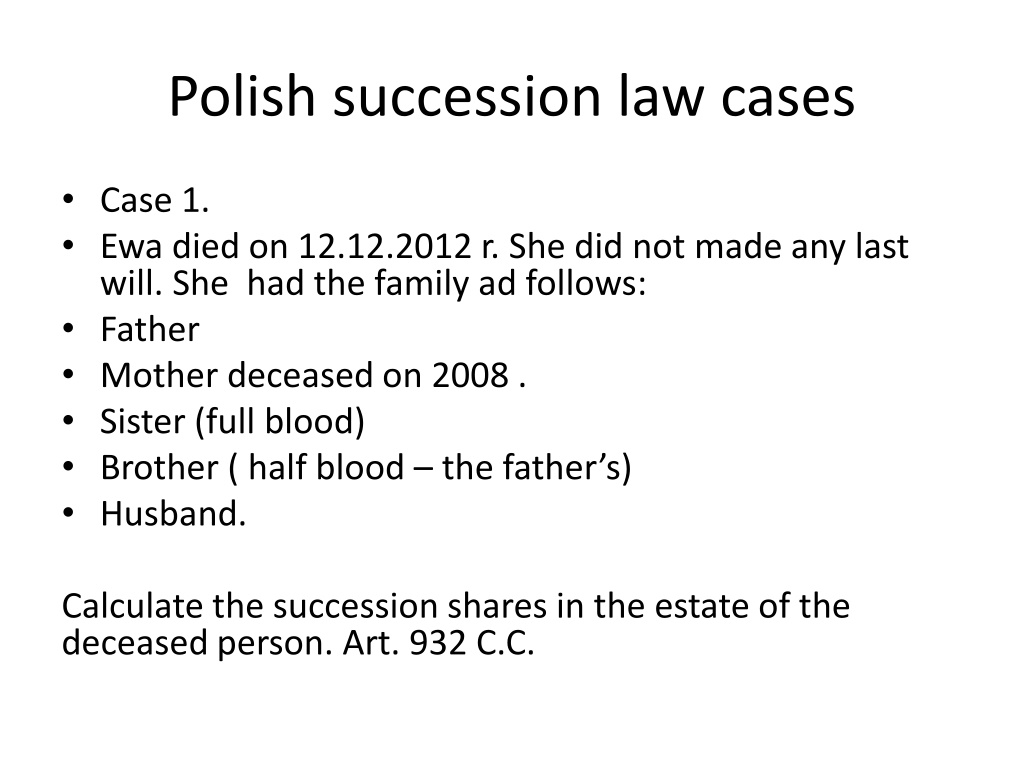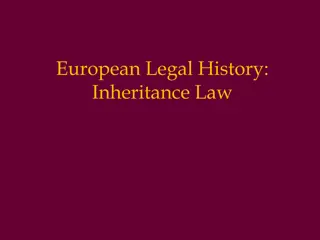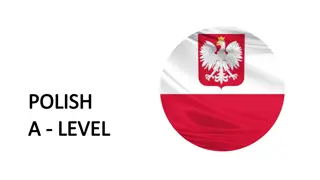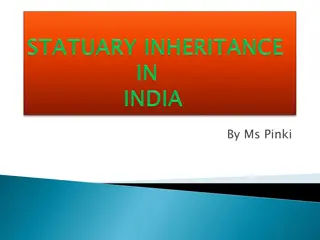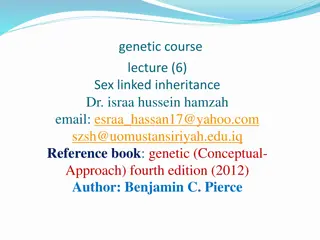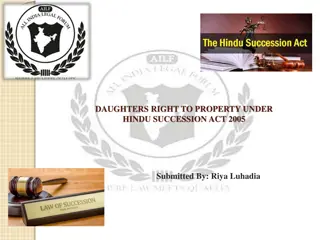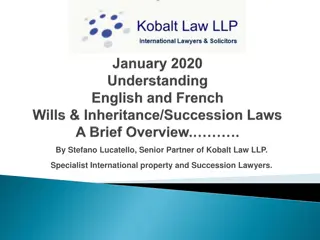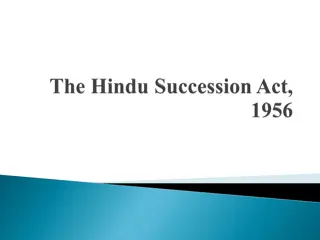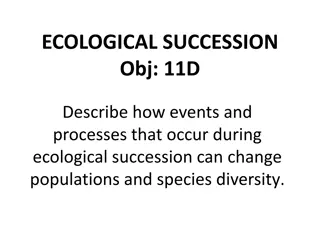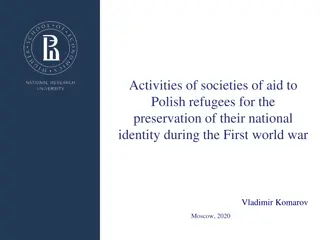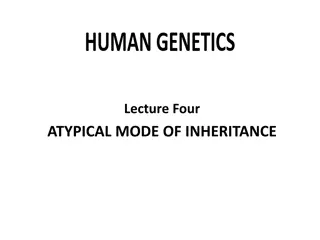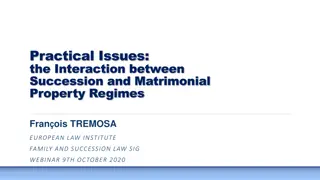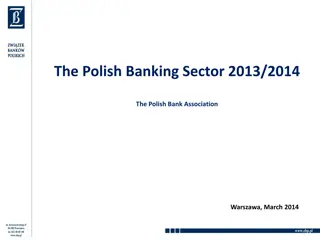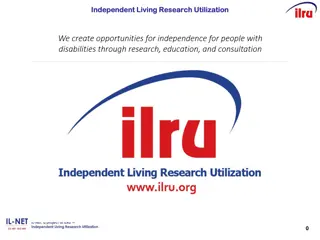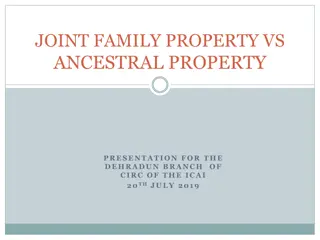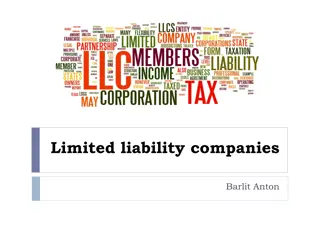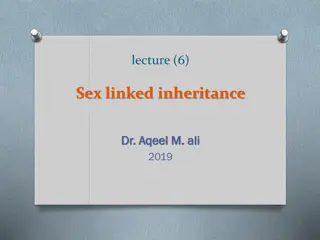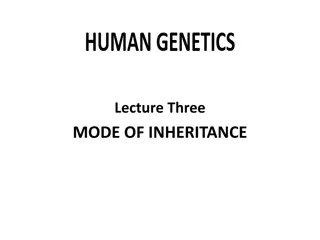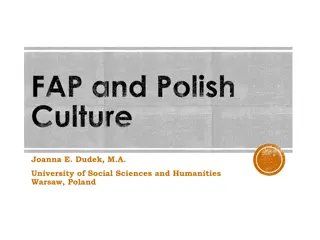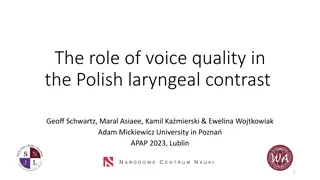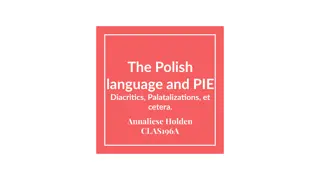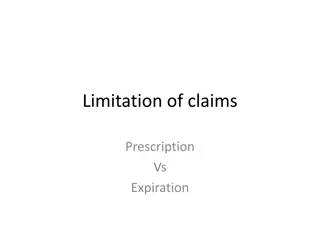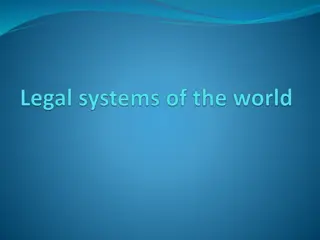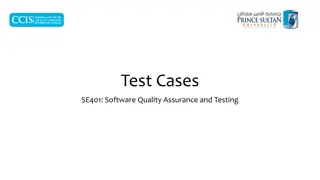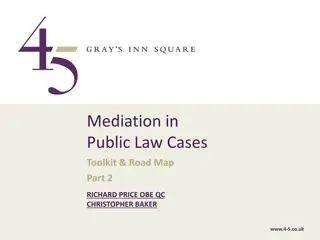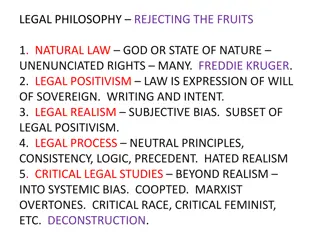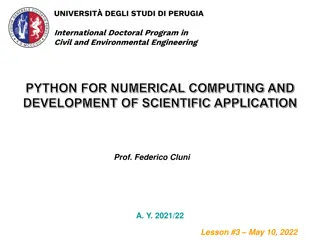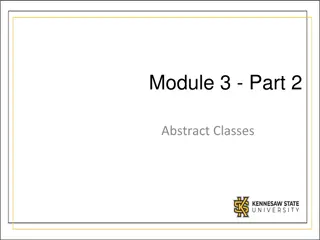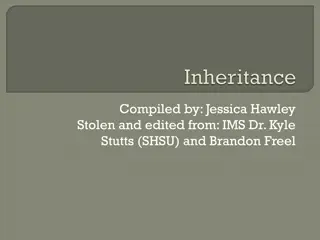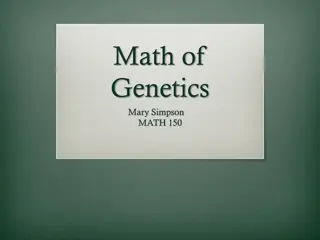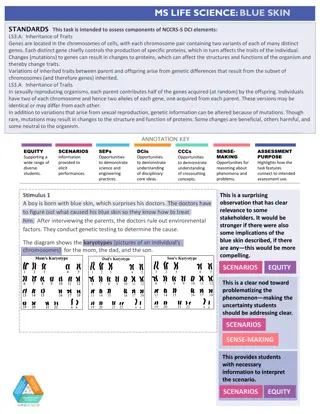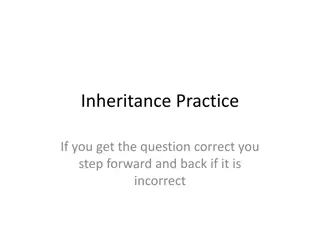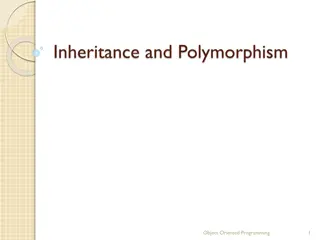Polish Succession Law Cases: Inheritance Scenarios and Legal Considerations
Explore two Polish succession law cases involving the intestate estate of Ewa and the will of Jan C., analyzing the family structures, inheritance shares, legacies, and legal implications, including the recognition of foreign succession documents and the application of EU regulations.
Download Presentation

Please find below an Image/Link to download the presentation.
The content on the website is provided AS IS for your information and personal use only. It may not be sold, licensed, or shared on other websites without obtaining consent from the author. Download presentation by click this link. If you encounter any issues during the download, it is possible that the publisher has removed the file from their server.
E N D
Presentation Transcript
Polish succession law cases Case 1. Ewa died on 12.12.2012 r. She did not made any last will. She had the family ad follows: Father Mother deceased on 2008 . Sister (full blood) Brother ( half blood the father s) Husband. Calculate the succession shares in the estate of the deceased person. Art. 932 C.C.
Jan C. died on 1.10.2012 r. He made his las will in handwriting, written on 1.9.2012 r., he decided in the will, that half of his estete wil be inherited by his sister Magda and her daughter Milena (17 years) and his mother Alice. He made also a legat (Vindicative lagat) for Milenia of his car of 50 000 PLN value. Mother Alice and the wife of Jan C. were dead in an accident on 3.9.2012 r. His father and half-blood (father s blood) brother are alive. JanC. had no children What dispositions will be enclosed in court certificate of succession under Polish Law ? Please consider that until now , none of the heirs made any declaration of the succession acceptance nor its rejection. Calculate the succession shares. The car was devastated in the accident, is Milena able to reject the legat and still receive the estate as Jan s successor ? Are the heirs entitled to make a notarial certificate of succession in this case ? Is anybody entitled to forced portion of the deceased estate (zachowek ?) Read : art. 1015, 1016, 931 3 , 991 1 , 9815CC.
International Private Law Succession law Dr Monika Drela
Recognition and enforcement of foreign succession documents in Poland Art. 1146 KPC Art. 1150 KPC
REGULATION (EU) No 650/2012 OF THE EUROPEAN PARLIAMENT AND OF THE COUNCIL of 4 July 2012 on jurisdiction, applicable law, recognition and enforcement of decisions and acceptance and enforcement of authentic instruments in matters of succession and on the creation of a European Certificate of Succession
The Union has set itself the objective of maintaining and developing an area of freedom, security and justice in which the free movement of persons is ensured. Management of conflict of law in succession cases mutual recognition of decisions in civil and commercial matters The new regulation will not affect the situation of people who remain resident in their home country.
this Regulation should not apply to: questions relating to matrimonial property regimes, including marriage settlements as known in some legal systems to the extent that such settlements do not deal with succession matters, and property regimes of relationships deemed to have comparable effects to marriage
Questions relating to the creation, administration and dissolution of trusts are also be excluded from the scope of this Regulation. This should not be understood as a general exclusion of trusts. Where a trust is created under a will or under statute in connection with intestate succession the law applicable to the succession under this Regulation should apply with respect to the devolution of the assets and the determination of the beneficiaries.
This Regulation should allow for the creation or the transfer by succession of a right in immovable or movable property as provided for in the law applicable to the succession. It should,not affect the limited number ( numerus clausus ) of rights in rem known in the national law of some Member States. A Member State should not be required to recognise a right in rem relating to property located in that Member State if the right in rem in question is not known in its law.
the law of the Member State in which the register is kept (for immovable property, the lex rei sitae) determines under what legal conditions and how the recording must be carried out and which authorities, such as land registers or notaries, are in charge of checking that all requirements are met and that the documentation presented or established is sufficient or contains the necessary information
Acts issued by notaries in matters of succession in the Member States should circulate under this Regulation
Habitual residence In certain cases, determining the deceased s habitual residence may prove complex. in particular, where the deceased for professional or economic reasons had gone to live abroad to work there, sometimes for a long time, but had maintained a close and stable connection with his State of origin. The deceased could, depending on the circumstances of the case, be considered still to have his habitual residence in his State of origin in which the centre of interests of his family and his social life was located.
Where the deceased lived in several States alternately or travelled from one State to another without settling permanently in any of them. If the deceased was a national of one of those States or had all his main assets in one of those States, his nationality or the location of those assets could be a special factor in the overall assessment of all the factual circumstances.
The rules of this Regulation are devised so as to ensure that the authority dealing with the succession will, in most situations, be applying its own law. This Regulation therefore provides for a series of mechanisms which would come into play where the deceased had chosen as the law to govern his succession the law of a Member State of which he was a national.
Lis pendens rule notice of pending action that has been started earlier and is waiting for closure the lis pendens rule must be applied if a parallel proceeding with the same cause of action and between the same parties is started rule is a lis pendens rule which will come into play if the same succession case is brought before different courts in different Member States. That rule will then determine which court should proceed to deal with the succession case.
Choice of law in last will the person drawing up a will also has the option of having his or her will read under the law of his or her Member State of origin. This will give EU citizens in general a new right, as it will allow anyone living abroad within the EU to retain close links with their home country and ensure that specific national provisions, such as rules governing gifts made during a lifetime, are respected. The regulation will enable people to choose in their Will to have the law of their native state applied to the whole of their estate. The choice of law cannot be implied. An express provision of this must therefore be drafted in the Will.
A choice of law under the Regulation should be valid even if the chosen law does not provide for a choice of law in matters of succession. It should however be for the chosen law to determine the substantive validity of the act of making the choice, that is to say, whether the person making the choice may be considered to have understood and consented to what he was doing. The same should apply to the act of modifying or revoking a choice of law.
The law determined as the law applicable to the succession should govern the succession from the opening of the succession to the transfer of ownership of the assets forming part of the estate to the beneficiaries as determined by that law. It should include questions relating to the administration of the estate and to liability for the debts under the succession. The payment of the debts under the succession may, depending, in particular, on the law applicable to the succession, include the taking into account of a specific ranking of the creditors.
European Certificate of Succession The use of the Certificate should not be mandatory. This means that persons entitled to apply for a Certificate should be under no obligation to do so but should be free to use the other instruments available under this Regulation (decisions, authentic instruments and court settlements). no authority or person presented with a Certificate issued in another Member State should be entitled to request that a decision, authentic instrument or court settlement be presented instead of the Certificate.
